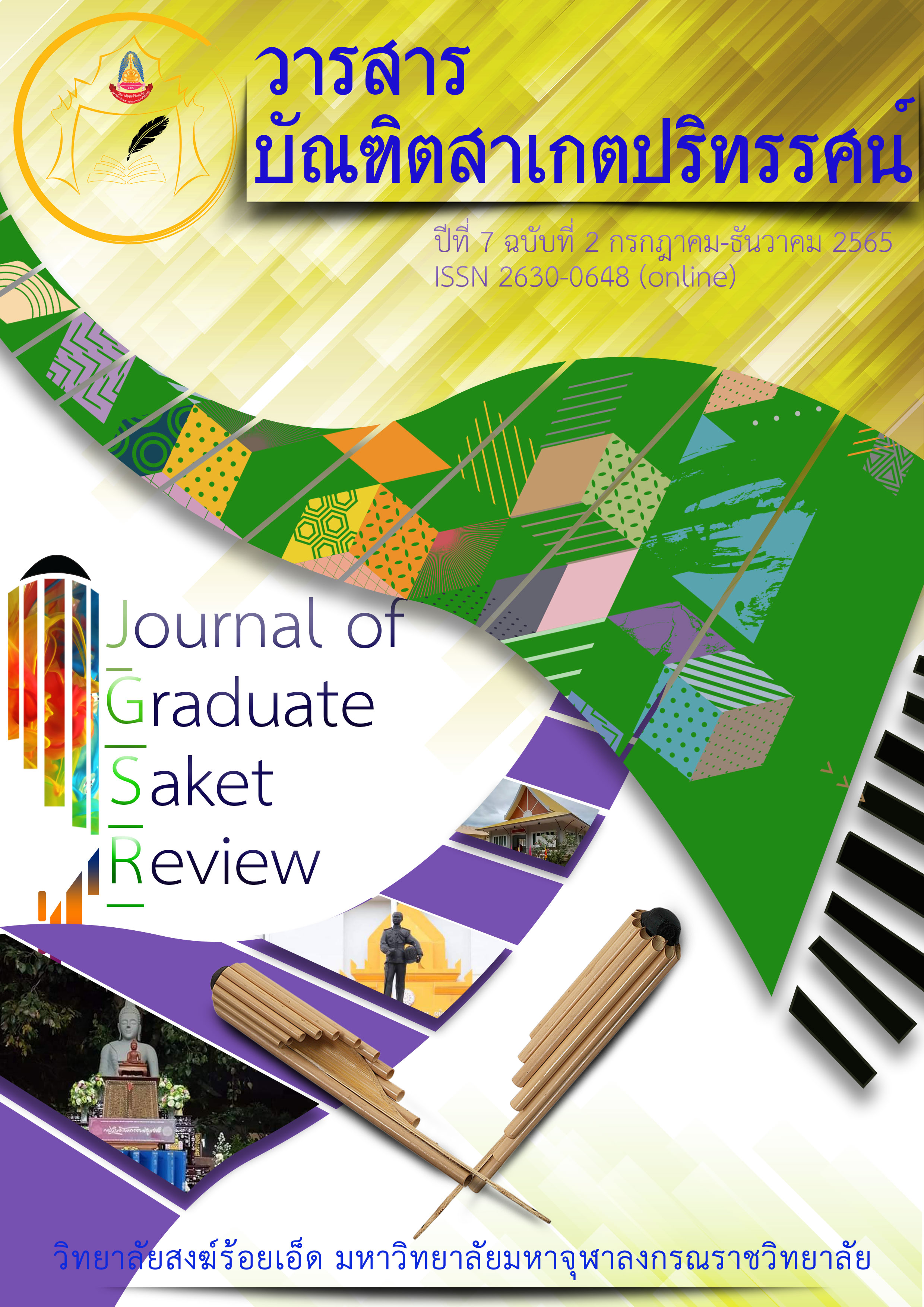ภาวะผู้นำตามหลักมรรค 8 ของผู้บริหารโรงเรียนพระปริยัติธรรม แผนกสามัญศึกษา เขต 4
Main Article Content
บทคัดย่อ
ปัจจุบันบทบาทของผู้นำ ได้มีการพัฒนาและเปลี่ยนแปลงไปจากเดิมเป็นอย่างมาก อันมีผลมาจากการเปลี่ยนแปลงอย่างรวดเร็วของสังคมโลกไม่ว่าจะเป็นการเปลี่ยนแปลงของสภาพสังคม เศรษฐกิจและวัฒนธรรม ตลอดจนความก้าวหน้าทางเทคโนโลยี ซึ่งตัวผู้นำเองจะต้องพัฒนาทักษะการใช้ภาวะผู้นำให้ทันกับสถานการณ์และพร้อมที่จะรับมือการเปลี่ยนแปลง การพัฒนามนุษย์ตามแนวทางของพระพุทธศาสนาจึงมีความสอดคล้องกับการพัฒนามนุษย์
การวิจัยครั้งนี้มีวัตถุประสงค์ 1) เพื่อศึกษาภาวะผู้นำของผู้บริหารโรงเรียนพระปริยัติธรรม แผนกสามัญศึกษา เขต 4 2) เพื่อศึกษาภาวะผู้นำตามหลักมรรค 8 ของผู้บริหารโรงเรียนพระปริยัติธรรม แผนกสามัญศึกษา เขต 4 และ 3) เพื่อเสนอแนวทางพัฒนาภาวะผู้นำตามหลักมรรค 8 ของผู้บริหารโรงเรียนพระปริยัติธรรม แผนกสามัญศึกษา เขต 4 ประชากร ได้แก่ บุคลากรทางการศึกษา จำนวน 239 คน ผลการวิจัยพบว่า 1) สภาพภาวะผู้นำของผู้บริหารโรงเรียนพระปริยัติธรรม แผนกสามัญศึกษา เขต 4 จำแนกเป็น 3 ลักษณะ คือ ภาวะผู้นำเชิงคุณลักษณะ พบว่า ผู้บริหารมีบุคลิกภาพที่ดีมีความน่าเชื่อถือ มีความมั่นใจในการทำงาน ภาวะผู้นำเชิงพฤติกรรม พบว่า ผู้บริหารแสดงออกถึงความสามารถในการจูงใจให้ผู้ใต้บังคับบัญชาหรือกลุ่มปฏิบัติงานด้วยความเต็มใจ ภาวะผู้นำเชิงสถานการณ์ พบว่า ผู้บริหารกำหนดรายละเอียดและขอบเขตของงานแก่ผู้ใต้บังคับบัญชา พยายามและรักษาความสัมพันธ์กับผู้ใต้บังคับบัญชา 2) ภาวะผู้นำตามหลักมรรค 8 ของผู้บริหารโรงเรียนพระปริยัติธรรม แผนกสามัญศึกษา เขต 4 โดยภาพรวม อยู่ในระดับมาก 3) แนวทางพัฒนาภาวะผู้นำตามหลักมรรค 8 ผู้บริหารควรให้ความสำคัญกับผู้ใต้บังคับบัญชาให้ได้รับโอกาส ในการตัดสินใจเลือกวิธีการทำงานได้อย่างอิสระด้วยตนเอง จัดวางตัวบุคลากร มอบหมายงานให้เหมาะสมกับความรู้ ความสามารถ เปิดโอกาสให้บุคลากรแสดงความคิดเห็นได้อย่างสร้างสรรค์ พร้อมทั้งนำความคิดเห็นไปใช้ ในการดำเนินงานในสถานศึกษา สนับสนุนโดยสร้างแรงจูงใจด้านสวัสดิการต่าง ๆ ให้ความยุติธรรมกับบุคลากรอย่างเท่าเทียมกัน เพื่อสร้างแรงจูงใจให้ผู้ใต้บังคับบัญชาทำงานจนประสบผลสำเร็จและบรรลุเป้าหมาย
Article Details

อนุญาตภายใต้เงื่อนไข Creative Commons Attribution-NonCommercial-NoDerivatives 4.0 International License.
เนื้อหาและข้อมูลในบทความที่ลงตีพิมพ์ในวารสารบัณฑิตสาเกตปริทรรศน์ ถือเป็นข้อคิดเห็นและความรับผิดชอบของผู้เขียนบทความโดยตรงซึ่งกองบรรณาธิการวารสาร ไม่จำเป็นต้องเห็นด้วย หรือร่วมรับผิดชอบใด ๆบทความ ข้อมูล เนื้อหา รูปภาพ ฯลฯ ที่ได้รับการตีพิมพ์ในวารสารบัณฑิตสาเกตปริทรรศน์ ถือเป็นลิขสิทธิ์ของวารสารบัณฑิตสาเกตปริทรรศน์ หากบุคคลหรือหน่วยงานใดต้องการนำทั้งหมดหรือส่วนหนึ่งส่วนใดไปเผยแพร่ต่อหรือเพื่อกระทำการใด ๆ จะต้องได้รับอนุญาตเป็นลายลักอักษรจากวารสารบัณฑิตสาเกตปริทรรศน์ ก่อนเท่านั้น
เอกสารอ้างอิง
ภาษาไทย
กระทรวงศึกษาธิการ. (2546). พระราชบัญญัติการศึกษาแห่งชาติ พุทธศักราช 2542 และที่แก้ไขเพิ่มเติม (ฉบับที่ 2) พุทธศักราช 2545. กรุงเทพมหานคร: องค์การรับส่งสินค้าและพัสดุภัณฑ์ (ร.ส.พ.).
คมนภัค กฤดากร ณ อยุธยา. (2559). ศึกษาการพัฒนาทรัพยากรมนุษย์ด้วยหลักพุทธปรัชญาเถรวาทในคัมภีร์
วิสุทธิมรรค. วิทยานิพนธ์ พุทธศาสนาและปรัชญา. มหาวิทยาลัยมหามกุฏราชวิทยาลัย.
ชุติมา รักษ์บางแหลม. (2560). วิเคราะห์องค์ประกอบภาวะผู้นำเชิงจริยธรรม และประเด็นปัญหาจริยธรรม ในการบริหารสถานศึกษาของผู้บริหารวิทยาลัยพยาบาล สังกัดสถาบันพระบรมราชชนก กระทรวงสาธารณสุข. ปริญญาศึกษาศาสตรดุษฎีบัณฑิต สาขาวิชาการบริหารการศึกษา มหาวิทยาลัยสงขลานครินทร์.
ณัฏธยาน์ภรณ์ เริ่มยินดี. (2561). การบริหารงานวิชาการตามหลักมรรค 8 ของโรงเรียนขยายโอกาสทางการศึกษา สังกัดสำนักงานเขตพื้นที่การศึกษาประถมศึกษาสุโขทัย เขต 2. พุทธศาสตรมหาบัณฑิต (การบริหารการศึกษา). บัณฑิตวิทยาลัย มหาวิทยาลัยมหาจุฬาลงกรณราชวิทยาลัย.
สุธาเนศ เพชรโปรี. (2560). ภาวะผู้นำเชิงพุทธของผู้บริหารสถานศึกษา. หลักสูตรพุทธศาสตรดุษฎีบัณฑิต มหาวิทยาลัยมหาจุฬาลงกรณราชวิทยาลัย.
สุรัตน์ ไชยชมภู. (2557). ภาวะผู้นำเชิงจริยธรรมในการบริหารสถานศึกษา. วารสารการบริหารการศึกษา มหาวิทยาลัยบูรพา. 8(2), 1-15.
สุริโย ปุริโส. (2562). การบริหารโรงเรียนประถมศึกษาที่ปฏิบัติเป็นเลิศ เขตตรวจราชการที่ 12 สังกัดสำนักงานคณะกรรมการการศึกษาขั้นพื้นฐาน : พหุกรณีศึกษา. ครุศาสตรดุษฎีบัณฑิต สาขาวิชาการบริหารการศึกษาและภาวะผู้นำ มหาวิทยาลัยราชภัฏสกลนคร.
ภาษาอังกฤษ
Ministry of Education. (2003). The National Education Act, 1999 and its amendments. (No. 2), Bangkok: Shipping and Package Organization (RorPorPorPor).
Komonphak Kridakorn Na Ayudhaya. (2016). A study of human resource development with Theravada Buddhist philosophy in the scriptures of the Visutthakhon. Thesis (M.Ed.) Buddhism and Philosophy, Mahamakut University.
Chutima Rakbanglaem. (2017). Analysis of the components of ethical leadership. and ethical issues in school administration of nursing college administrators under the royal institute Ministry of Public Health. Doctor of Education degree Department of
Educational Administration Prince of Songkla University.
Nattayaphon Rermydee. (2018). Academic administration according to the 8th Path principal of the school expands educational opportunities. Under the Sukhothai Primary Educational Service Area Office 2. Master of Arts (Educational Administration), Graduate School Mahachulalongkornrajavidyalaya University.
Suthanet Petchpori. (2017). Buddhist Leadership of School Administrators. Doctor of Philosophy
Program Mahachulalongkornrajavidyalaya University.
Surat Chaichomphu. (2014). Ethical Leadership in Educational Administration. Journal of
Educational Administration Burapha University. 8(2) 1-15.
Suriyo Puriso. (2019). Excellent primary school administration. Government Inspectorate Area 12 under the Office of the Basic Education Commission: Multi-case Study. Doctor of Education in Educational Administration and Leadership. Sakon Nakhon Rajabhat University.
Daft, R. (2008). The Leadership Experience. (4th ed.). Mason, OH: Thomson South-Western.
Rue and Byars. (2007). Management: skills and application. 12th ed, Boston: McGraw-Hill/Irwin.
Tetsuya Abe & Sachin Chowdhery. (2012). World-Class Leadership. London: World Scientific.


